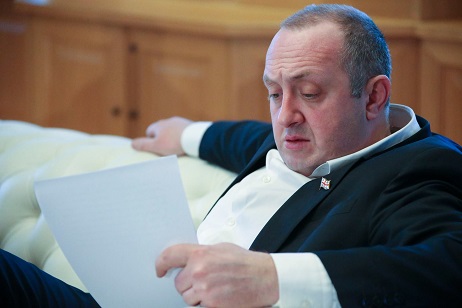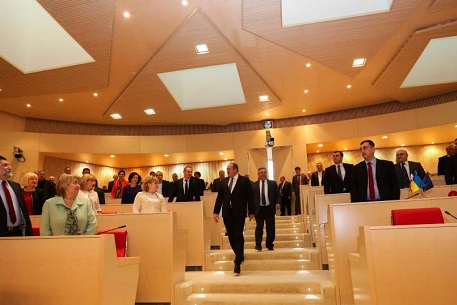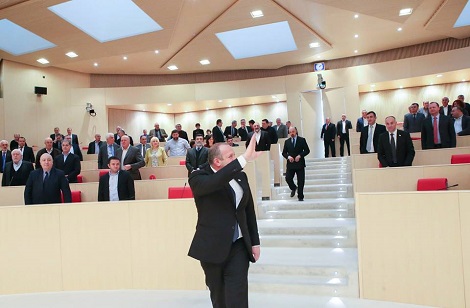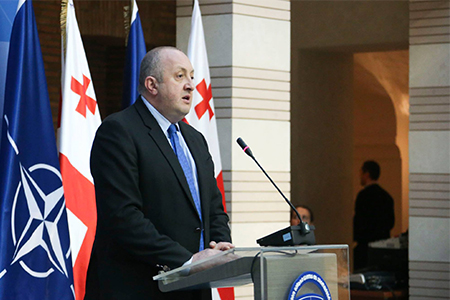Georgia’s President delivers annual speech at Parliament
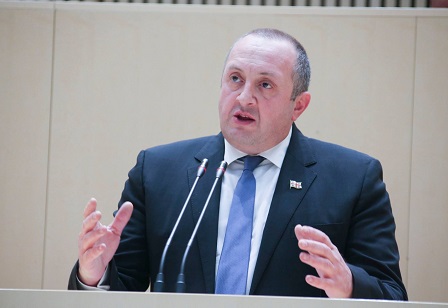
Georgia’s European and Euro-Atlantic aspirations, the countries relations with foreign states including the United States (US) and Russia, the economic situation and recent reforms were some of the topics Georgia’s President Giorgi Margvelashvili touched upon in his annul address to Parliament today.
President Margvelashvili delivered his third annual address about the state of the nation to lawmakers in Parliament of Georgia. His speech lasted about an hour and covered a number of issues of state importance.
Margvelashvili’s address assessed the country’s achievements of the past year, the challenges it faced and his vision for the future.
The President began his speech by asking Parliament to observe a moment of silence to honour a "good friend of his”, Georgia’s late Prime Minister Zurab Zhvania, who died 11 years ago today.
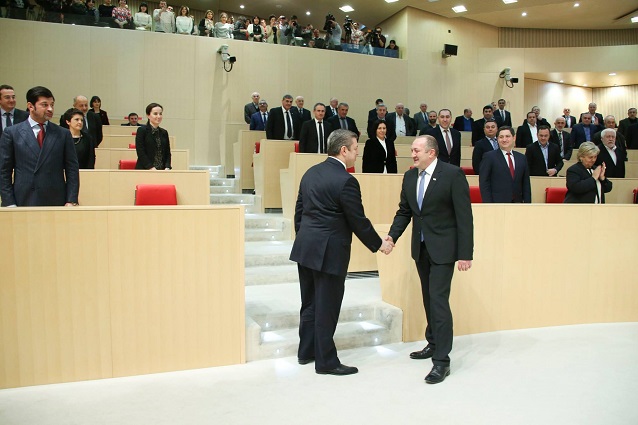
Prime Minister Giorgi Kvirikashvili (L), President Giorgi Margvelashvili shake a hand as they meet at Parliament on February 3, 2016. Photo by the President's Press Office
The President’s address was heard by 107 Members of Parliament, Prime Minister Giorgi Kvirikashvili and almost all Cabinet Members. Other guests in Parliament who heard the speech included head of Georgia’s National Bank, the chairpersons of Georgia’s Supreme and Constitutional Courts, Georgia-accredited foreign Ambassadors and other high-ranking guests.
He began by stressing one fifth of Georgia’s territory was still occupied by a foreign nation. And one fifth of Georgia’s population had emigrated due to hard economic times.
Economic difficulties
Margvelashvili said 2015 was a tough year for Georgia and its economy. He named several external factors which he believed were behind Georgia’s economic difficulties. This included:
- The global economic slowdown, especially in emerging markets;
- Strengthening of the US dollar;
- Falling of oil prices to a record low;
- Economic recession of Russia and Ukraine in the wake of the Russia-Ukraine war; and
- Economic difficulties that emerged after political tension between Russia and Turkey.
The President feared 2016 would be no better for Georgia and its people as these issues still existed.
Margvelashvili expressed his dissatisfaction with the fact that small and medium-sized (SMEs) businesses only made up 20 percent of the country’s economy.
"The unemployment rate is very high and among those who are employed, the number of people employed in the public sector is non-proportionally high,” he said.
However Margvelashvili welcomed the Government’s plan of how to develop the economy. He also expressed his satisfaction with the recent positive changes, among them launching Free Trade negotiations with China.
He also voiced an initiative that agriculture should become a business in the country and works needed to be carried out in this direction.
Upcoming elections
The President believed the main political challenge for the country in 2016 was the upcoming Parliamentary Elections.
Margvelashvili said it was "obvious” the election environment had improved since 2012, and the next elections in autumn also needed to be held in a manner that would not raise questions about its transparency and fairness.
He called on the Government not to postpone the planned electoral reform and implement the new election system for this year’s elections.
Media freedom
Media freedom was of utmost importance and he said the guarantee of a "healthy election environment” was free media. "It is our duty to ensure freedom of expression and media freedom,” he said.
"Today there is media pluralism in Georgia and it is a great achievement of our society, which needs permanent protecting and strengthening. This process should deepen,” the President stressed.
On the other side of the coin, Margvelashvili criticized the low level of protection of a person’s private life. The President said in 2015 a number of people, including media representatives, talked about how others had attempted to manipulate and blackmail using illegal recordings or illegal videos that showed details of a person’s intimate private life.
"This means there still is a lot to be done to better protect the right to a private life.”
Recommended reforms
In his annual address, President Margvelashvili identified several areas that he believed needed to be reformed.
Margvelashvili said the country needed to continue its judicial reform and he offered several initiatives he thought would be useful for this reform.
He also said the course of reforms needed to be maintained at the Chief Prosecutor’s Office, the Ministry of Internal Affairs and at the National Bank. This being said, the President recommended Parliament and the Government to use "best international practices” while implementing these reforms.
He also encouraged the self-governance reform and said local self-governments needed to be given "actual power”.
The energy sector was something the President touched on in his speech, and he made specific mention of Georgia’s recent negotiations with Gazprom.
"Gazprom is not only focused on the energy sector. We should not forget that Russia uses its energy levers for political purposes.” For this reason, Georgia’s negotiations with Gazprom needed to be very transparent, he said.
How was the President’s speech assessed?
After President Margvelashvili spoke, Parliament Speaker David Usupashvili noted the same hall of the Parliament hosted the country’s Prime Minister too, where Kvirikashvili voiced his Government’s political ideas.
"It is very encouraging to listen to the same pathos from both leaders,” Usupashvili said.
The Speaker’s opinion was shared by Cabinet Members. Those who attended today’s event said they were glad to see that Georgia’s President and Government had similar outlooks regarding the directions of the country’s development.
"It was an interesting address with many interesting accents,” PM Kvirikashvili said.
"It is noteworthy that [the President] welcomed the Government’s four-point reform program.”
He added that healthy constitutional processes and stable relations between different branches of the Government would make Georgia a "solid country” in the eyes of investors and international partners.
The President’s "ideology” and his speech was praised by parliamentary opposition Free Democrats. The party’s representative Zurab Abashidze said Margvelashvili covered all important issues in his speech.
The President’s speech was strongly disliked by another opposition party, the United National Movement (UNM). Its member Pavle Kublashvili said the President "talked a lot but he did not say anything”. He assessed the speech as "very general” and not focused on society’s interests.
Directly after the President’s speech Parliament took an hour break before it continued at 5.30pm, where the head of each fraction was given 15 minutes to comment on the President’s speech.
There are 12 fractions in the Georgian Parliament, meaning speeches are expected to continue until late evening.
 Tweet
Tweet  Share
Share
